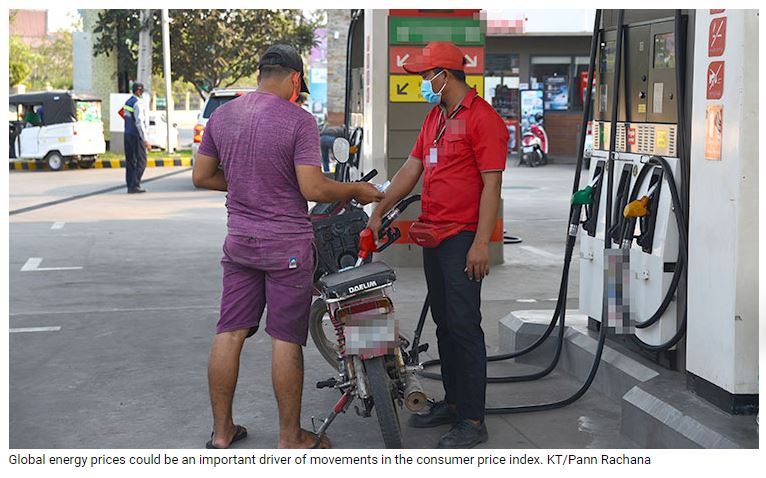Oil price shock impact on headline inflation bigger in Cambodia
The impact of an oil price shock on headline inflation is bigger in Cambodia, according to an AMRO Analytical Note that examined the impact of rising global energy prices on inflation in the ASEAN+3 region.
“The impact is the largest in Cambodia and Vietnam, at around 0.06 percentage points,” the note titled ‘Fueling Inflation in ASEAN+3: The Rising Price of Energy’ said.
It pointed out that similar to other regions of the world since February 2022, all ASEAN+3 economies have seen an increase in consumer price inflation, albeit to different degrees.
“Among the Plus-3, inflation in Korea has reached record highs while inflation in Hong Kong has been moderate. Among ASEAN economies, inflation has been rising steadily in Indonesia, Malaysia, and Vietnam; more sharply in Cambodia, the Philippines, Singapore, and Thailand; and very sharply in Lao PDR,” it observed.
While elaborating on the impact in ASEAN + 3 countries, it said, “Country-by-country regressions show that the impact of an oil price shock on headline inflation is bigger in Cambodia, the Philippines, Thailand, Singapore, and Vietnam, compared with Brunei, Indonesia, and Malaysia, possibly related to the latter group’s net energy-exporter status.”
At the same time, the study said that the impact of an oil price shock on headline inflation in the Plus-3 economies is moderate, possibly due to their economic size which could influence world oil demand and prices.
It said global energy prices could be an important driver of movements in the consumer price index (CPI). “The extent to which global energy prices affect the CPI depends on factors such as weight of energy and energy-intensive goods and services (e.g., transport) in the consumer price basket and the degree of pass-through of fuel import prices to domestic retail prices on the supply side; as well as the strength of aggregate demand — for example, the start of the war in Ukraine coincided with post-pandemic economic reopening in many economies, which introduced a boost in aggregate demand and a separate driver of inflation pressure on top of escalating energy prices,” the note said, adding that a principal components analysis suggests that global energy prices are a key driver of headline inflation in some ASEAN+3 economies.
The report said some ASEAN+3 economies had used fiscal policy measures to help blunt the impact of high energy prices on headline inflation, at least temporarily.
“Most of the region’s oil exporters have a price stabilisation mechanism that compensates (“subsidises”) producers for keeping domestic prices unchanged when world oil prices go up,” it said.
Among the region’s energy importers, some (e.g., Japan) have introduced new subsidies or extended existing subsidies for fuel products like gasoline and diesel, and some (e.g., Korea and Thailand) have lowered fuel taxes.
However, the study pointed out that with the global energy prices rising, such policies may become harder to sustain as their budgetary costs escalate.
“Soaring global energy prices triggered by the war in Ukraine are putting upward pressure on inflation in the region. Headline CPI inflation in all ASEAN+3 economies has risen in recent months, reaching multi-year highs in some economies such as Korea, the Philippines, and Thailand,” the study observed.
The empirical analysis presented in the note suggested that energy prices are an important driver of inflation in most economies in the region, especially for those that are net energy importers with a high share of energy-intensive goods and services (e.g., transport) in their consumption basket.
It said fiscal policy measures such as price subsidies and tax cuts on fuel products are helping to prevent a sharper increase in inflation in some economies. However, it cautioned that these measures are costly and should be more targeted.
“The budgetary cost of fuel subsidies will not be sustainable if global energy prices stay high or continue to climb — even for net energy exporters, which typically have generous blanket subsidies,” it noted.
The start of the war in February led to a surge in crude oil prices as fears were triggered of disruption in energy exports. The benchmark Brent crude price reached a record high of $138 per barrel on 8 March 2022 — the highest level since 2008. It said the global energy prices are expected to stay high for the rest of this and next year.
“Natural gas prices are expected to soar in the winter given Russia’s decision to shut down the main supply pipelines to Europe. Oil prices could be supported by stronger demand from the recovering global economy and consumers switching from natural gas to oil. Soaring natural gas prices will also increase demand for coal,” it said.
The US Energy Information Administration (EIA) forecasts the spot price of Brent crude oil will average $102.1 per barrel and the Henry Hub natural gas price will average $7.54 per MMBtu in the second half of 2022 (EIA 2022).
The World Bank forecasts that European gas prices will average $34.0 per MMBtu in 2022 and that energy prices will remain high in 2023. The price forecasts are subject to a high degree of uncertainty, including how sanctions on and countersanctions by Russia unfold and OPEC+ production decisions.
While talking about energy consumption and trade in ASEAN +3, the report said, “The ASEAN+3 region relies more on coal than other forms of energy. More than half of the region’s energy consumption is sourced from coal — compared to about a quarter of the world’s energy consumption — mainly reflecting the energy mix in China. Other ASEAN+3 economies have a larger share of oil in their energy mix, while Brunei depends more on natural gas.”
It said Cambodia, Japan, Korea, Myanmar, the Philippines, and Singapore import almost all of their oil consumption. China, Indonesia, Thailand, and Vietnam have some domestic oil production and import the rest of their consumption. Malaysia’s production is almost enough for its consumption. Only Brunei is a net exporter of oil.
Source: https://www.khmertimeskh.com/501154679/oil-price-shock-impact-on-headline-inflation-bigger-in-cambodia/


 English
English




